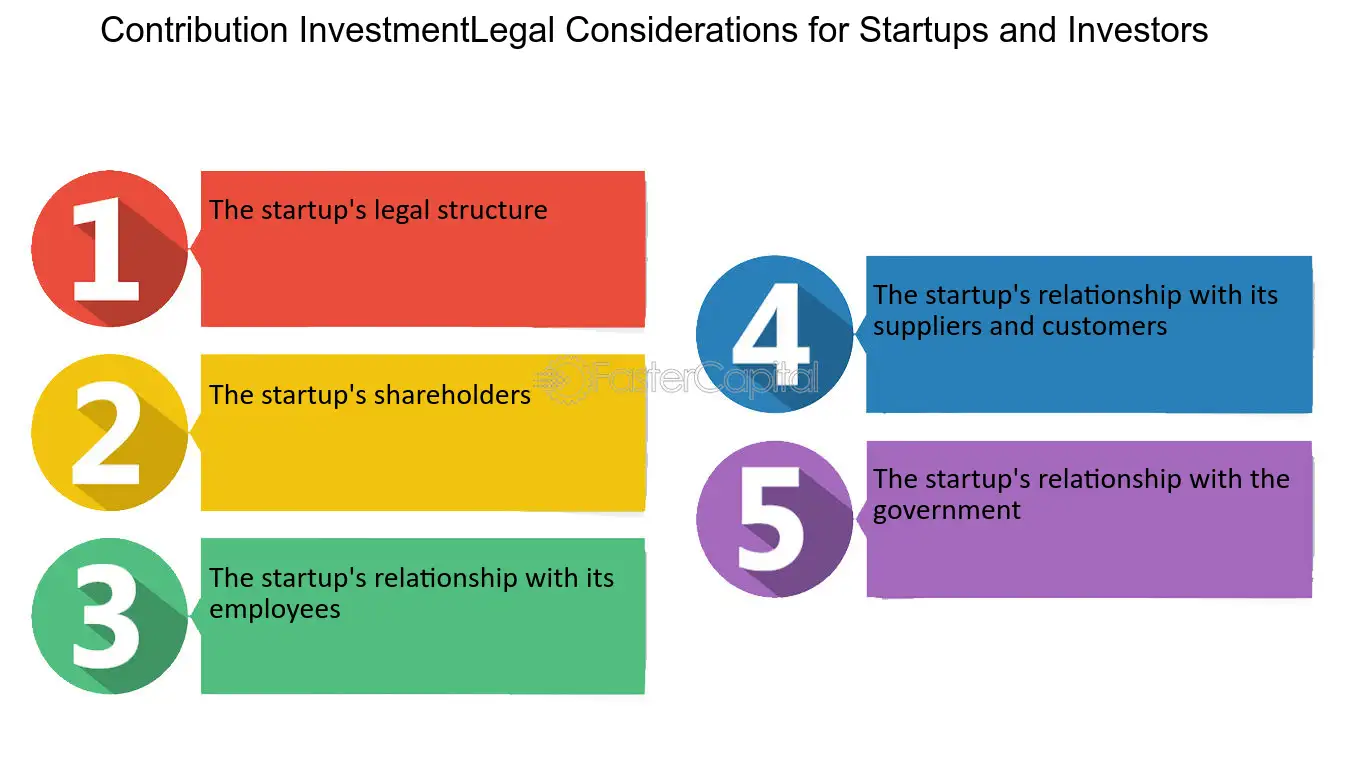Legal Considerations for Startups: A Comprehensive Guide
Starting a business is an exhilarating journey filled with possibilities and challenges. However, navigating the legal landscape is crucial to ensuring your startup’s long-term success. Understanding legal considerations early on can save you from potential pitfalls down the line. In this article, we will explore essential legal aspects that every entrepreneur should consider when launching a startup.

Understanding the Importance of Legal Considerations for Startups
Why Legal Foundations Matter for Startups
Legal considerations form the backbone of any business. They provide the framework within which your startup operates, ensuring compliance with laws and regulations while protecting your rights. Here are a few reasons why having strong legal foundations is vital:
- Protection Against Liability: By establishing the right business structure, you can protect your personal assets from business debts and lawsuits.
- Credibility: A legally compliant business enhances your credibility with customers, suppliers, and investors. It shows that you are serious and responsible.
- Operational Continuity: Understanding the laws that govern your industry ensures that you avoid interruptions caused by legal issues.
Common Legal Pitfalls for New Businesses
Navigating the legal landscape can be tricky. Many startups fall into common traps that can lead to significant problems. Here are a few pitfalls to avoid:
- Neglecting Business Structure: Failing to choose the right business structure can expose you to personal liability.
- Ignoring Compliance: Overlooking local, state, and federal regulations can lead to hefty fines and shutdowns.
- Inadequate Contracts: Not having solid contracts in place can result in misunderstandings and disputes.
Choosing the Right Business Structure
One of the first legal considerations for any startup is deciding on the right business structure. Your choice will affect your liability, taxes, and overall operations.
Sole Proprietorship
A sole proprietorship is the simplest business structure, where you operate your business as an individual. This option is easy to set up and gives you complete control. However, it does not provide liability protection, meaning your personal assets could be at risk if the business incurs debt.
Partnership
A partnership involves two or more individuals who agree to share profits and losses. While this structure allows for combined resources and skills, it also means shared liability. It’s crucial to draft a partnership agreement to outline each partner’s responsibilities and profit-sharing arrangements.
Limited Liability Company (LLC)
A Limited Liability Company (LLC) offers the flexibility of a partnership while providing liability protection. This structure helps shield your personal assets from business debts and legal actions, making it a popular choice for many startups.
Corporation
Incorporating your business establishes it as a separate legal entity. This means that the corporation itself is liable for its debts and obligations. Corporations can issue stocks and have perpetual existence, but they also require more regulatory compliance and paperwork than other structures.
Complying with Regulatory Requirements
Once you’ve chosen your business structure, it’s crucial to comply with relevant regulations. This will ensure that you operate within the law and avoid penalties.
Business Licenses and Permits
Most startups will need to obtain various licenses and permits to operate legally. These can vary by industry and location. For example, a restaurant may require health permits, while a construction company may need specific building permits. Always check with your local government to ensure compliance.
Understanding Employment Laws
As your startup grows and you begin hiring employees, it’s essential to understand employment laws. This includes:
- Wage and Hour Laws: Ensure you comply with minimum wage and overtime pay regulations.
- Workplace Safety: Familiarize yourself with OSHA regulations to maintain a safe work environment.
- Anti-Discrimination Laws: Understand your obligations under laws that prevent discrimination in hiring and employment practices.
Data Protection and Privacy Regulations
In today’s digital age, protecting customer data is paramount. Compliance with data protection laws (like GDPR for EU customers or CCPA in California) is essential to avoid hefty fines and build customer trust. This includes:
- Implementing data protection measures.
- Being transparent about how you collect and use customer data.
- Ensuring customers can exercise their rights regarding their data.
Protecting Your Intellectual Property
Intellectual property (IP) is often one of a startup’s most valuable assets. Protecting it should be a top priority.
Trademarks: The Importance of Brand Protection
Registering a trademark for your brand name, logo, or slogan is essential for preventing others from using your identity. A trademark not only protects your brand but also enhances its value over time.
Patents: Securing Your Inventions
If your startup has developed a unique product or process, consider applying for a patent. This grants you exclusive rights to use and commercialize your invention, preventing others from copying it.
Copyrights: Protecting Creative Works
If your business produces original content, such as software, music, or artwork, you should consider obtaining copyright protection. This ensures that your creative works are legally protected against unauthorized use.

Drafting and Negotiating Contracts
Contracts are crucial for formalizing relationships with clients, suppliers, and employees. A well-drafted contract can prevent misunderstandings and disputes.
Key Components of Business Contracts
When drafting contracts, be sure to include the following key components:
- Clear Definitions: Clearly define terms to avoid ambiguity.
- Payment Terms: Outline payment amounts, deadlines, and methods.
- Responsibilities: Specify the roles and obligations of each party.
- Termination Clause: Include conditions under which the contract can be terminated.
Common Types of Contracts for Startups
- Service Agreements: Outline terms for services provided to clients.
- Non-Disclosure Agreements (NDAs): Protect confidential information when sharing it with potential partners or employees.
- Employment Contracts: Define the terms of employment, including job responsibilities and compensation.
Seeking Legal Counsel
Navigating the legal landscape can be daunting. Knowing when to hire a lawyer can save you time, money, and potential headaches.
When to Hire a Lawyer
Consider hiring a legal professional in the following situations:
- Business Formation: When choosing your business structure.
- Contracts: Before signing any significant agreements.
- Compliance Issues: When dealing with regulatory requirements.
Finding the Right Legal Professional
When looking for legal counsel, consider these factors:
- Experience: Look for a lawyer with experience in your industry.
- Reputation: Check reviews and ask for referrals.
- Fees: Understand their fee structure and ensure it fits your budget.
In the second half of the article, we will address FAQs about legal considerations for startups, summarize key points, and provide actionable insights for navigating the legal landscape effectively.
Frequently Asked Questions (FAQs)
1. What are the most common legal issues startups face?
Startups often encounter various legal challenges, including:
- Choosing the wrong business structure: This can expose personal assets to business liabilities.
- Failing to comply with regulations: Neglecting to obtain necessary licenses or permits can lead to fines and legal trouble.
- Intellectual property disputes: Inadequate protection of your brand or product can result in infringement issues.
2. How can I protect my startup’s intellectual property?
To safeguard your startup’s intellectual property, consider the following steps:
- Register trademarks for your brand names and logos.
- Apply for patents if you have a unique product or invention.
- Utilize copyrights for original content, ensuring it’s protected against unauthorized use.
3. Do I need a lawyer to start a business?
While it’s possible to start a business without a lawyer, hiring one can significantly reduce the risk of legal complications. A lawyer can help you navigate the complex legal landscape, ensuring compliance and protecting your interests.
4. What types of business licenses do I need?
The licenses required vary by industry and location. Generally, you might need:
- Business licenses from your local or state government.
- Health permits for food-related businesses.
- Professional licenses if your industry requires specialized knowledge (like medical or legal fields).
5. What is a partnership agreement, and do I need one?
A partnership agreement is a legal document that outlines the roles, responsibilities, and profit-sharing arrangements of each partner in a business. This agreement is crucial to avoid disputes and ensure smooth operations.
6. How can I ensure compliance with employment laws?
To comply with employment laws, stay informed about regulations regarding:
- Wages and hours: Ensure you’re paying at least the minimum wage and following overtime regulations.
- Workplace safety: Follow guidelines set by OSHA to maintain a safe environment for employees.
- Anti-discrimination laws: Familiarize yourself with laws that prevent discrimination based on race, gender, age, etc.
7. What should I include in my contracts?
When drafting contracts, make sure to include:
- Definitions of key terms
- Payment terms and deadlines
- Responsibilities of each party
- Termination clauses outlining conditions for ending the agreement
Conclusion: Navigating the Legal Landscape with Confidence
Navigating the legal considerations of starting a business is undoubtedly challenging, but it’s an essential part of building a successful venture. By understanding the legal frameworks and regulations that apply to your startup, you can protect your assets, establish credibility, and ensure operational continuity.
As you embark on your entrepreneurial journey, remember the following key takeaways:
- Choose the Right Business Structure: This decision impacts your liability and tax obligations.
- Comply with Regulations: Stay informed about local, state, and federal requirements to avoid penalties.
- Protect Your Intellectual Property: Take proactive steps to secure your innovations and branding.
- Draft Solid Contracts: Ensure all agreements are clear and legally binding to prevent disputes.
- Seek Legal Counsel: Don’t hesitate to engage a lawyer when needed to navigate complex legal issues.
By prioritizing these legal considerations, you can focus on growing your startup with confidence, knowing that you’re on solid legal ground.
Additional Resources
For more insights on legal considerations and startup strategies, check out the following resources:
- SCORE: A Resource for Small Business Owners
- U.S. Small Business Administration: Starting a Business
- FindLaw: Legal Guides for Startups
Navigating the legal complexities of starting a business is vital for success. Equip yourself with the right knowledge, seek professional help when needed, and watch your startup thrive!


